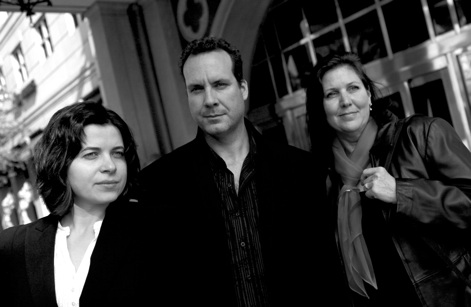Chamber group takes pulse of new music for Sunday Afternoons

Pulse Chamber Music performed Sunday evening at Gusman Concert Hall.
Pulse Chamber Music, a trio of violin, clarinet and piano made up of UM-affiliated musicians, provided an eclectic program highlighting living composers in the Sunday Afternoons of Music concert series at Gusman Hall.
Aram Khachaturian’s Trio is a daring piece with which to begin a program. Rather than building off of the tenuous sway of the piano’s introduction, the violin and clarinet enter with layered melodies that demand equal attention. No voice should stick out but all should remain certain in their own melodic endeavor. The even temperaments and balance achieved between pianist Marina Radiushina, clarinetist Margaret Donaghue Flavin, and violinist/violist Scott Flavin, showed the impressive cohesion of the group.
Semi-Suite, composed by University of Miami conductor Thomas Sleeper seemed a logical progression in programming from the Khachaturian. Each movement seemed to alternate between determined rage and an awkward collision where no voice would back down. Similar to the Khachaturian Trio, the players often drove independent themes before crashing together in what proved to be a startling unison—a device that proved effective within an otherwise cyclical work.
The ensemble finished the first half with Mozart’s Kegelstatt Trio, K. 498. In addition to Mozart seeming somewhat out of place in the program, the musicians’ approach felt far too romanticized, with languid melodic lines and too much pedal on the piano. There was more idiomatic style in the Rondeaux–Allegretto.
In an effort to promote the work of living composers, Pulse Chamber Music put out a call for scores. As a result they received Pamela Madsen’s Sea Change and Dave Rimelis’ Jobs.
Sea Change is a short, programmatic work beginning with spoken text – provided by the pianist – which is layered over the score. A strong rolling motif is introduced before the piano starts the evolution with cashing and stirring, layered by the wary rocking in violin and the distant echoing call of the clarinet. The climax brings chaos in rhythm and texture until the music breaks into serenity.
Dave Rimelis’ Jobs suite was playful and programmatic. “The Plumber” had strong jazz themes and musical jokes as a dripping leak motif passed from instrument to instrument. “The Photographer” was saccharine with airs of nostalgia while “The Ambulance Driver” commanded attention with frantic trills before the melodic lines scurried to and fro.
“The Elevator Operator” fell and climbed while remaining lackadaisical, and “The Mystery Writer” was bordered on both the romantic and sinister in a nod to classic film noir. Finally, the set concluded with “The Street Vendor,” which contained the sort of jaunty melodies one would expect to accompany a Disney animation where the plants and squirrels smile large and bob along. Strong swing rhythms were interspersed before returning to the crowd pleasing main theme.
Fritz Kreisler’s Cavatina was arranged by Flavin upon the request of Doreen Marx, the executive director of the Sunday Afternoon series. This was the world premiere of this arrangement which proved both melodic and luxurious in execution without being indulgent.
To finish off the program, the trio presented Mark Lanz Weiser’s Kegelstatt Funk. Despite what the programming may suggest, Kegelstatt Funk contains no actual Mozart references but rather was a piece originally commissioned for the Kegelstatt Trio group. While the composition was not particularly interesting during the primary “funk” sections, the development added thematic layers and a pleasing irregularity.
For an encore, the trio performed an arrangement of Gershwin’s Prelude no. 2 in C Sharp Minor.
Posted in Performances
Leave a Comment
Tue Apr 23, 2013
at 11:56 am
No Comments